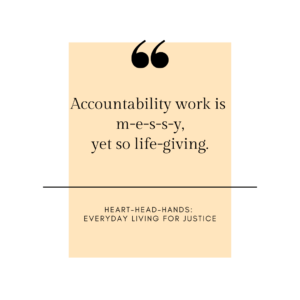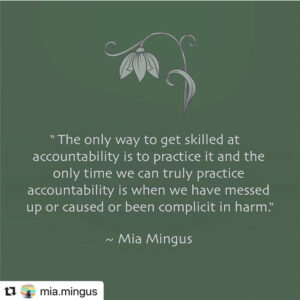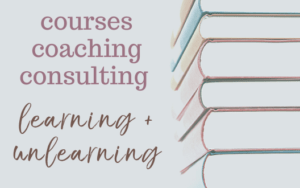This week’s processing group asked the question: “How do we build more accountable lives?”
In the past few months, I’ve been inspired by and drawn into this question, using it to reflect on how I act on (and fall short of acting on) my commitments.
I’m greatly influenced by community organizer Mia Mingus whose work focuses on transformative justice and disability justice. During Wednesday’s group, I read aloud a recent Instagram post by Mia Mingus, and I want to share it through this blog, too, as I’m sure to come back to these words again and again. They offer essential lessons on everyday living for justice.
Along with the post (quoted below) and the invitation to check out Mia Mingus’s blog, let me share that the processing group brought up a lot of important connections and questions about accountability. These include:
- What feels closer to or further away from accountability?
- To whom are we accountable? And why? Why not others?
- How have we learned to avoid conflict and, therefore, vulnerability?
- How is whiteness wound up with conflict avoidance?
- How do we unlearn avoidance patterns and lean into mess and moments of messing up?
- How do we invest in repair?
- What prevents us from taking accountability?
- What does it mean to take on the right-sized piece?
- How do commitments determine what accountability we’re investing in?
- Where is my energy going (on an ongoing, everyday basis), and is it bringing me closer to or further from alignment with accountability?
I hope these questions may resonate with you, too, and as always, I invite you to join the Wednesday processing groups. A schedule of questions through fall 2020 is now posted with the registration page.
With gratitude for learning alongside you, and with gratitude for Mia Mingus, Rasha Diab, and others inquiring into and teaching about accountability and transformative justice,
Beth
Striving Toward Accountability: Insights from Mia Mingus
Here’s the Instagram post from August 6th, quoted in full to preserve the context and layered insights:
#Repost @mia.mingus with @make_repost
You can read and theorize all you want, but the only way to truly build the skills necessary for taking accountability is to practice them in real time when we mess up. We can learn to embrace these moments as chances to practice accountability, realignment and reorientation. We will lose our grounding again and again, and we can practice how to come back, return and re-ground.
Accountability is not stagnant, it may look different each time. You may excel in taking accountability in one relationship and struggle with it in another. You may have strong skills in some parts of accountability and little-to-no skills in other parts (see “the Four Parts of Accountability” in my writings highlight). For example, you may be very good at self reflection, but feel clueless at repair. You may know all the technical parts of accountability, but can’t capture the “spirit of accountability” (from Philly Stands Up). You may be used to being over accountable and taking on everything or being under accountable and taking on nothing—neither are helpful or accountable.
You can also practice the many skill sets that are needed for accountability in your everyday life in small ways, which will help you later when the stakes are higher. For example: being able to recognize and address things when they happen, rather than letting them fester or avoiding them; practicing strong, open and clear communication, being able to express your (hurt) feelings to someone or ask for what you need; learning how to set and respect boundaries; investing in your own healing; building pod* relationships w people who can support you in your accountability (*link to pods in Pod highlight), learning how to change your behavior.Always reflect on what you are practicing because you are always practicing something. 🌱
Repost @sarah.greenman.creative[image of simple white text on an ashy, muted green background that reads, “The only way to get skilled it accountability is to practice it and the only time we can truly practice it is when we have messed up or caused or been complicit in harm.” ~ Mia Mingus.”]
Please check out Mingus’s work, including “How to Give a Good Apology Part 1: The Four Parts of Accountability,” “How to Give a Good Apology Part 2: The Apology—the What and the How,” and “Pods and Pod Mapping Worksheet.” Like this Instagram post, these are pieces that leave me thinking about how we’re conditioned (typically not toward accountability) and what needs to change in order to build more accountable lives.
And How Am I Striving Toward Accountability?
Here’s where I am with answering this question, as I share in my commitments statement:
Too often, we’re trained to value what’s comfortable and easy and to avoid conflict and, therefore, to avoid accountability. Instead, I value showing up imperfectly, committed to striving. This means that I’m not only making mistakes, doing harm, and learning in real-time, but I’m also showing up as a learner/un-learner in public, which feels scary and always humbling. (I repeat Docta E’s mantra “do it scared” on a regular basis.)
Accountability and support structures are essential, and these have taken different shapes in my life over time, including coaching, counseling, close friendships, and co-authoring groups as well as academic review processes and mentoring relationships. Currently, I’m investing daily in pod relationship-building and accountability work: strengthening reciprocal relationships with a small group of processing partners who help with striving toward accountability and reaching toward repair. These “pod people” include four other people who are engaged in similar questions of unlearning whiteness and white supremacy and the harm we do through these systems. The work is m-e-s-s-y, yet so life-giving.
I have a lot to learn about speaking truthfully, breaking patterns of people-pleasing, and embracing conflict. And I commit (again) to never stop learning and unlearning. I do this from a place self-compassion, staying with calls to show up steadily, with stamina and staying power.

—
This post is written by Beth Godbee, Ph.D. for Heart-Head-Hands.com. If you’re interested in learning more, read the full commitment statement.
Become a subscriber via Patreon to receive ongoing support for your efforts of striving to live for justice (social, racial, and environmental justice). And consider subscribing to the newsletter for additional resources and announcements. Thanks!





Leave a Reply